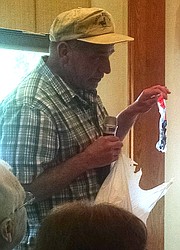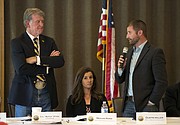State capital comes north
Coeur d'Alene Press | UPDATED 7 years, 8 months AGO
By BRIAN WALKER
Staff Writer
HAYDEN LAKE — They came with questions, concerns and even beef jerky when Hayden Lake was the state's Capital for a Day on Thursday.
About 45 citizens brought a myriad of questions to Gov. Butch Otter and his team of state officials representing several departments at the temporary capitol building at Hayden Lake Country Club.
State government is brought to communities outside Boise each month for Capital for a Day to allow local residents to discuss issues with officials.
Resident Russ McLain plunked down packets of Tomahawk Beef Jerky at the front table for the officials to sample, hoping to entice them to have the state, not the feds, more involved in the regulation of such businesses.
McLain, who spoke on behalf of his friend and company owner Jeff Tobin, said Tomahawk's jerky production has had to be scaled back due to government regulations.
"You can't afford enough attorneys to read the USDA Bible that they give you," McLain said during a break. "And, once you do, they give you the New Testament. The state needs to do its own inspections and take the feds out of it. My friend has worked hard, he's gotten the squeeze and it needs to be fixed."
Beverly Hanson, representing the Veterans of Foreign Wars Auxiliary in Coeur d'Alene, asked the leaders to consider increasing the size of the future veterans home in Post Falls from 68 beds to 108 due to the expected increase in demand.
"With our Vietnam veterans, there's a big bubble (in demand) coming up," she said.
Otter assured Hanson the project is moving along and the demographics will be explored.
Sid Smith, representing Sen. Jim Risch, R-Idaho, said several lawmakers, including Risch, recently signed a letter urging more and expedited funding for such homes.
"It's a huge need that needs to be sped up," Smith said. "The fact that we have the land donated and the state of Idaho has provided the funding puts us in a good position in case other (homes) fall out. We are ready to go, and we'll make sure that we're up to speed with local needs."
Dee Jameson urged the officials to continue to make improvements to U.S. 95 a priority in the name of commerce.
"It will improve the economy of the state in general and bring north and south together," Jameson said.
Jim Coleman, representing the Idaho Transportation Board, said U.S. 95 work will continue to be a priority of his so the state can grasp commerce that's been deferred to neighboring states due to inadequate Idaho highways.
"We'll do what we can with the limited amount of funds the state has for transportation," Coleman said. "We're not really catching up; we're just not falling further behind."
John Rubert, who lives on Hayden Lake, said he's concerned about the water quality on the lake. He said this spring's rain washed ash from last year's burning season into the lake.
"The north end of the lake turned gray because of all the ash," he said, adding he has received the run-around from state agencies. "The smoke will not leave because we're in a bowl. My concern is that we're not protecting the lake enough."
John Tippets, Department of Environmental Quality director, said his agency has an agreement with the Bureau of Land Management and U.S. Forest Service on when the best times to burn are. However, private landowners are not required to comply with some of DEQ's smoke management laws.
Tippets said DEQ is working on a smoke management plan so private landowners will be required to call the agency before burning. He said it may be up to a year before DEQ implements the plan because it needs to go through a public comment period.
"We don't want to stop burning," he said. "We just want to make sure that it is done in a responsible way."
Don Pischner, a former legislator, said he has felt a trend of pushing septic system issues from the local to the state level.
“I’m fond of local health districts handling problems in local areas,” he said.
Both Tippets and Dale Peck, the Panhandle Health District’s environmental and health protection administrator, said they aren’t aware of any push to have the state assume more such responsibility.
However, Peck said most of the "easy" sites for permitting septic systems are gone.
"That's probably where the tightening is," Peck told Pischner. "The sites are more difficult, particularly on the waterfront."







